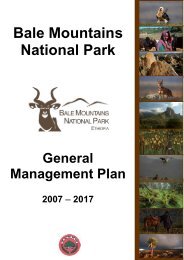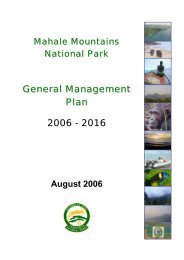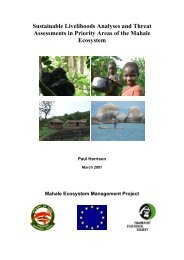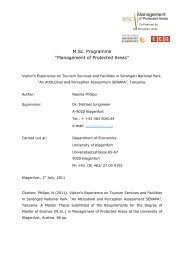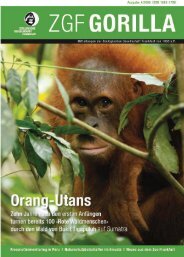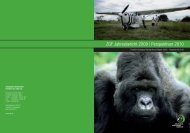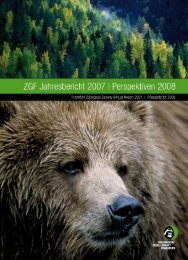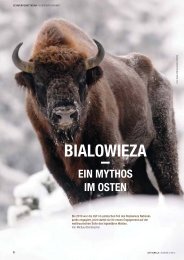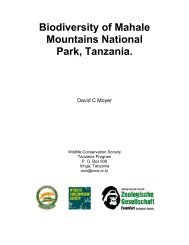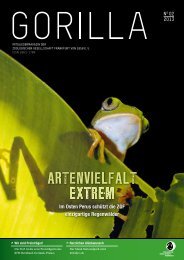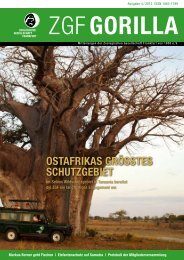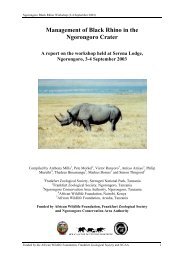Walia Special Edition on the Bale Mountains (2011) - Zoologische ...
Walia Special Edition on the Bale Mountains (2011) - Zoologische ...
Walia Special Edition on the Bale Mountains (2011) - Zoologische ...
You also want an ePaper? Increase the reach of your titles
YUMPU automatically turns print PDFs into web optimized ePapers that Google loves.
This <str<strong>on</strong>g>Special</str<strong>on</strong>g> <str<strong>on</strong>g>Editi<strong>on</strong></str<strong>on</strong>g> of <str<strong>on</strong>g>Walia</str<strong>on</strong>g> is Dedicated to Sim<strong>on</strong> Thirgood<br />
1962-2009<br />
From a vantage point <strong>on</strong> <strong>the</strong> Morobawa plateau in <strong>the</strong> <strong>Bale</strong> <strong>Mountains</strong>, in <strong>the</strong> warm sunlight, Sim<strong>on</strong> and I<br />
sink down into a couple of tussocks of Festuca grass. The year was 2003 and we were looking around for<br />
potential sites for <strong>the</strong> project that we were tentatively calling <strong>the</strong> <strong>Bale</strong> Ecosystem Project. Having spent a few<br />
hours walking over <strong>the</strong> plateau, we settled in <strong>the</strong> warm grass and, deeply c<strong>on</strong>tent, our c<strong>on</strong>versati<strong>on</strong> roamed<br />
from <strong>the</strong> minutiae of <strong>the</strong> research questi<strong>on</strong>s to which we wanted answers to <strong>the</strong> intractability of barriers to<br />
c<strong>on</strong>servati<strong>on</strong> in Ethiopia to <strong>the</strong> allure of <strong>the</strong> <strong>Bale</strong> <strong>Mountains</strong>.<br />
Sim<strong>on</strong> Thirgood was an applied ecologist, born in Liberia in 1962 and brought up in Canada. His<br />
professi<strong>on</strong>al work was built <strong>on</strong> a solid scientific foundati<strong>on</strong> with a PhD from <strong>the</strong> University of Southampt<strong>on</strong><br />
<strong>on</strong> <strong>the</strong> behavioural ecology of fallow deer and post-doctoral work, based out of <strong>the</strong> University of Cambridge,<br />
<strong>on</strong> <strong>the</strong> mating system of black lechwe in Zambia. From 1992, <strong>the</strong> practical applicati<strong>on</strong> of ecology grew in<br />
his work, initially through <strong>the</strong> Joint Raptor Study which examined <strong>the</strong> interacti<strong>on</strong> between <strong>the</strong> management<br />
of moorlands in Scotland for driven grouse shooting and <strong>the</strong> c<strong>on</strong>servati<strong>on</strong> of birds of prey. This work<br />
culminated in his first book, Birds of Prey and Red Grouse which he co-authored with Steve Redpath. His<br />
interest in Ethiopia emerged through his relati<strong>on</strong>ship with Karen Laurens<strong>on</strong> and her work <strong>on</strong> diseases am<strong>on</strong>g<br />
wild carnivores and domestic dogs in <strong>the</strong> <strong>Bale</strong> <strong>Mountains</strong> - as a key to understanding <strong>the</strong> disease threats to<br />
Ethiopian wolves. Sim<strong>on</strong>’s interest and work in c<strong>on</strong>servati<strong>on</strong> culminated in his appointment, with Karen, as<br />
Programme Manager for <strong>the</strong> Frankfurt Zoological Society (FZS). Sim<strong>on</strong>, Karen and <strong>the</strong>ir young family were<br />
based in <strong>the</strong> Serengeti and he was resp<strong>on</strong>sible for projects in Tanzania and Zambia. Sim<strong>on</strong> also had significant<br />
input into FZS projects in Ethiopia and elsewhere in Africa. Following two years in <strong>the</strong> Serengeti, Sim<strong>on</strong><br />
was offered <strong>the</strong> positi<strong>on</strong> of Head of Ecology at <strong>the</strong> Macaulay Land Use Research Institute in Aberdeen. In<br />
recogniti<strong>on</strong> of his abilities as an applied ecologist, he became <strong>on</strong>e of <strong>the</strong> editors of <strong>the</strong> Journal of Applied<br />
Ecology and, at this point, he edited his sec<strong>on</strong>d book - People and Wildlife: C<strong>on</strong>flict or Co-existence (coedited<br />
with Rosie Woodroffe and Alan Rabinowitz).<br />
From 1995, when Sim<strong>on</strong> first visited Ethiopia, his commitment to <strong>the</strong> country and <strong>the</strong> c<strong>on</strong>servati<strong>on</strong><br />
of its unique biodiversity and ecosystems grew. Throughout his career, he recognised <strong>the</strong> value of investing<br />
time and energy in mentoring talented students and, as such, he supported or supervised three PhD Ethiopian<br />
students (Anagaw Atickem, Anteneh Shimelis and Ermias Admasu) as well as o<strong>the</strong>r post-graduate students<br />
from <strong>the</strong> Universities of Oxford and Addis Ababa. He was generous with his time and support of <strong>the</strong> students,<br />
working with <strong>the</strong>m through <strong>the</strong> questi<strong>on</strong>s <strong>the</strong>y were setting out to answer and he became a role model for<br />
many of <strong>the</strong>se young people. He was also excited by <strong>the</strong> potential to seek answers to research questi<strong>on</strong>s in<br />
Afroalpine ecosystems such as those in <strong>the</strong> <strong>Bale</strong> <strong>Mountains</strong> and any brief walk with him in <strong>the</strong> mountains<br />
always led to questi<strong>on</strong>s being asked and hypo<strong>the</strong>ses being proffered. He recognised <strong>the</strong> extraordinary value<br />
and allure of <strong>the</strong> <strong>Bale</strong> <strong>Mountains</strong> and, with Karen, ensured that it became a key site for FZS’s work in Africa.<br />
Sim<strong>on</strong>’s untimely death in August 2009, while working to set up a project, funded by <strong>the</strong> Darwin<br />
Initiative, to streng<strong>the</strong>n <strong>the</strong> community c<strong>on</strong>servati<strong>on</strong> work of <strong>the</strong> people in Guassa-Menz, means that his<br />
c<strong>on</strong>tributi<strong>on</strong> to science and c<strong>on</strong>servati<strong>on</strong> in Ethiopia will probably remain intangible, unmeasured. And yet<br />
his influence and legacy will be profound, primarily through <strong>the</strong> people to whom he reached out and touched<br />
with his energy, clarity of visi<strong>on</strong> and thought, and his acerbic but always accurate evaluati<strong>on</strong>s of <strong>the</strong>ir work.<br />
<str<strong>on</strong>g>Walia</str<strong>on</strong>g>-<str<strong>on</strong>g>Special</str<strong>on</strong>g> <str<strong>on</strong>g>Editi<strong>on</strong></str<strong>on</strong>g> <strong>on</strong> <strong>the</strong> <strong>Bale</strong> <strong>Mountains</strong> I



